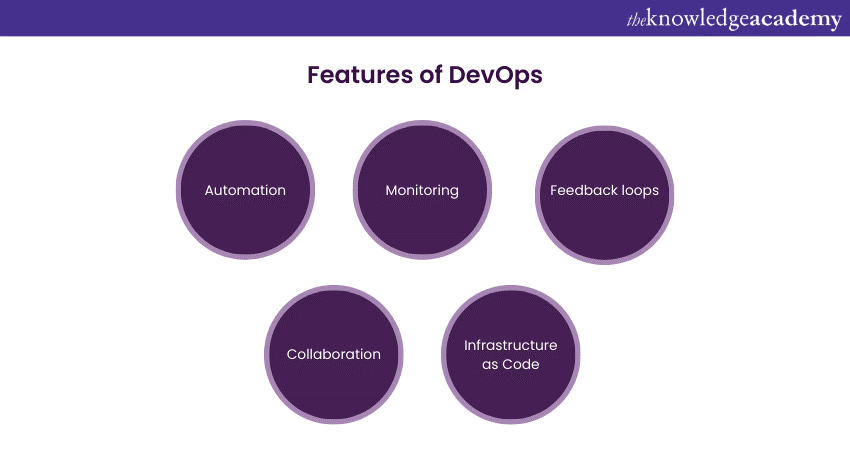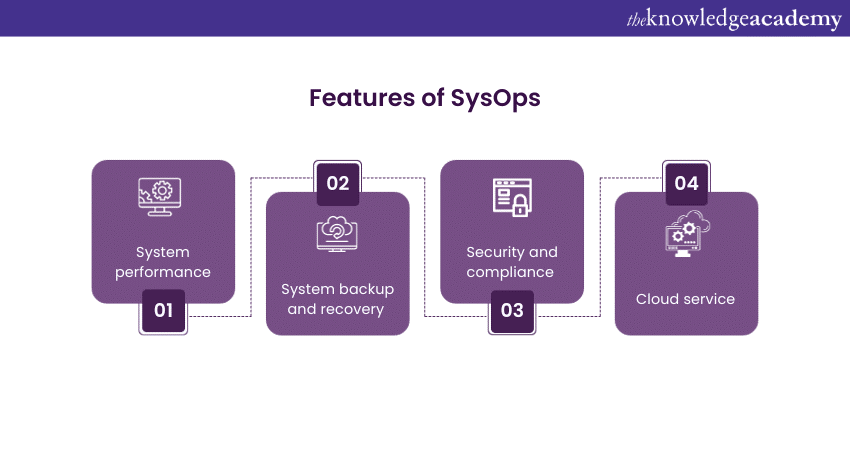We may not have the course you’re looking for. If you enquire or give us a call on 01344203999 and speak to our training experts, we may still be able to help with your training requirements.
We ensure quality, budget-alignment, and timely delivery by our expert instructors.

If you work in the IT industry, you might have heard of the terms SysOps vs DevOps. But what do they mean, and how do they differ? And, more importantly, which one is more suitable for your organisation and your career goals? In this blog, we will explore SysOps vs DevOps and the similarities and differences to help you choose the best approach for your needs.
Table of Contents
1) What is DevOps?
2) What is SysOps?
3) Key differences between SysOps and DevOps
4) DevOps vs SysOps - Which is more suitable?
5) Conclusion
What is DevOps?
DevOps is a Software Development methodology focusing on communication and collaboration between Software Developers and Information Technology (IT) professionals. The goal of DevOps is to shorten the Software Development Life Cycle and provide faster delivery of features and bug fixes. DevOps is achieved through automation, monitoring, and feedback loops. Automation helps to reduce the time it takes to deliver software updates, while monitoring provides visibility into the status of the Software Development process. Feedback loops allow for rapid iterations and corrections based on user feedback. DevOps is an essential part of modern Software Development and is used by many organisations to improve their release cycle times.
Some of the features of DevOps are:

a) Automation: DevOps relies heavily on automation tools, such as Puppet and Chef, to manage server deployments, configuration management, testing, and Continuous Integration and Delivery. Automation helps to reduce the time it takes to deliver software updates while ensuring consistency and quality.
b) Monitoring: DevOps uses monitoring tools, such as Nagios and Zabbix, to provide visibility into the status of the Software Development process, the performance of the servers, and the User Experience. Monitoring helps to identify and resolve issues quickly, as well as to collect data for analysis and improvement.
c) Feedback loops: DevOps uses feedback loops to enable rapid iterations and corrections based on user feedback, metrics, and testing results. Feedback loops help ensure that the software meets the customer’s needs and expectations and learns from failures and successes.
d) Collaboration: DevOps fosters collaboration between Developers and operations teams, as well as between other stakeholders, such as customers, Business Analysts, and quality assurance. Collaboration helps to break down the silos and barriers that often exist between different teams and to align the goals and objectives of the Software Development process.
e) Infrastructure as Code: DevOps treats Infrastructure as Code, meaning that the configuration and management of the servers, networks, and other resources are done through code rather than manual processes. Infrastructure as Code helps to ensure that the infrastructure is consistent, scalable, and reproducible and enables Version Control and testing.
What is SysOps?
SysOps, short for Systems Operations, is a term that encompasses a wide range of IT operations and administration. It includes monitoring and managing system performance, system backups and recovery, and ensuring security and compliance. The term has also included DevOps or automating the Software Development Lifecycle in recent years. Sysops Engineers are the System Administrators who manage all the key responsibilities of the IT operations in a multiuser environment. They are also responsible for administrating cloud services and tasks related to the Software Development process.
Some of the features of SysOps are:

a) System performance: SysOps is responsible for ensuring that the system performance is optimal by tuning the servers, networks, and other resources, as well as by troubleshooting and resolving any issues that may arise. SysOps also monitors the system performance and reports any anomalies or deviations from the expected standards.
b) System backups and recovery: SysOps is responsible for ensuring that the system data is backed up regularly and securely and for restoring the data in case of any disaster or failure. SysOps also tests the backup and recovery procedures and verifies the data's integrity.
c) Security and compliance: SysOps is responsible for ensuring that the system's security is robust by implementing and enforcing policies, rules, and best practices, as well as detecting and preventing any unauthorised access or attacks. SysOps also ensures that the system complies with the relevant regulations and standards, such as GDPR, HIPAA, PCI DSS, etc.
d) Cloud services: SysOps is responsible for administrating the cloud services and tasks related to the Software Development process, such as provisioning, scaling, updating, and terminating the cloud resources, as well as managing the cloud costs and billing. SysOps also works with the Developers and operations teams to support the Software Development process in the cloud environment.
Advance your DevOps expertise with our Certified DevOps Security Professional (CDSOP) Course. Register today!
Key differences between SysOps and DevOps
The primary difference between SysOps and DevOps is their focus and objectives. DevOps focuses on Software Development and delivery, while SysOps focuses on managing and maintaining IT infrastructure and systems. It leads to differences in team structure, workflow and processes, tools and technologies used, and metrics and measurements. Here are some of the key differences between SysOps and DevOps:
a) Operations: In DevOps, development and operations teams are merged into a single team that works on the entire Software Development Lifecycle. In SysOps, development and operations teams are separate teams that work on different aspects of the Software Development process.
b) Usage: DevOps uses automation extensively to manage server deployments and configuration. DevOps also treats Infrastructure as Code, meaning that the infrastructure is defined and managed using code and Version Control. SysOps uses manual processes to manage server deployments and configuration. SysOps does not treat Infrastructure as Code, meaning that the infrastructure is not defined and managed using code and Version Control.
c) CI/CD: DevOps uses Continuous Integration and Delivery (CI/CD) to speed up Software Development. CI/CD is a practice that involves merging small chunks of new code into the code base frequently and then automatically testing and deploying them to the production environment. SysOps does not use CI/CD, meaning the Software Development process is slower and less frequent.
d) Responsibility: DevOps Engineers play a crucial role in both DevOps Engineer roles and responsibilities, handling a system's development and operations. They write, test, deploy, and monitor code while also troubleshooting issues and fixing bugs. On the other hand, SysOps Engineers focus solely on system operations rather than development. They are responsible for monitoring and managing system performance, security, and availability, along with troubleshooting and resolving problems.
e) Methodology: DevOps follows an Agile methodology, a flexible and iterative approach to Software Development. Agile methodology allows frequent changes and adaptations based on user feedback and market demands. SysOps follows the Waterfall methodology, a linear and sequential approach to Software Development. Waterfall methodology allows for more control and planning but less flexibility and responsiveness.
f) Architecture: DevOps prefers a microservices architecture, a modular and scalable approach to Software Development. Microservices architecture involves breaking down a large and complex application into smaller and independent services that communicate with each other. SysOps prefers a monolithic architecture, a traditional and simple approach to Software Development. Monolithic architecture involves building a large, complex application as a single, indivisible unit.
g) Speed: DevOps allows for faster software delivery and more frequent deployments. DevOps also enables faster feedback and improvement cycles. SysOps allows more control over the software delivery process, as well as stability and reliability. SysOps also enables more security and compliance checks.
h) Collaboration: DevOps fosters collaboration between Developers and operations teams. DevOps also encourages cross-functional and self-organising teams that share knowledge and skills. SysOps fosters collaboration between systems administrators and other IT professionals. SysOps also encourages specialisation and division of labour among teams.
|
Aspect |
DevOps |
SysOps |
|
Teams |
Development and operations teams merged |
Separate development and operations teams |
|
Usage |
Automation, Infrastructure as Code (IaC) |
Manual processes, no Infrastructure as Code |
|
CI/CD |
Continuous Integration and Delivery (CI/CD) |
No CI/CD, slower and less frequent development |
|
Responsibility |
Development and operations combined |
Operations-focused, not involved in development |
|
Methodology |
Agile |
Waterfall |
|
Architecture |
Microservices |
Monolithic |
|
Speed |
Faster software delivery, frequent deployments |
Control, stability, security, and compliance checks |
|
Collaboration |
Collaboration between development and operations |
Collaboration among Systems Administrators |
Improve your SecOps skills through our Certified SecOps Professional Course.
DevOps vs SysOps - Which is more suitable?
There is no definitive answer to which approach is more suitable, as it depends on various factors such as the nature of the project, the size of the organisation, the team's culture, and the stakeholders' goals. However, here are some general guidelines to help you decide:
a) Choose DevOps if you want to deliver software faster and more frequently and value innovation and customer satisfaction. DevOps is ideal for projects requiring frequent changes and adaptations and for organisations that want to stay ahead of the competition and meet the market's ever-changing needs.
b) Choose SysOps if you want to manage and maintain IT infrastructure and systems and value security and compliance. SysOps is ideal for projects that require stability and reliability and for organisations that want to ensure the quality and performance of their IT systems.
Uncover the Differences Between Chef, Puppet, and Ansible in our expert guide! Read now!
Conclusion
SysOps and DevOps are two different approaches to Software Development and IT operations. They have different focuses, objectives, and practices. Although DevOps and Sysops are different, site relaiblity engineers bridge the gap between development and operation ensuring stable reliable systems. They also have different advantages and disadvantages. Depending on your project, organisation, team, and goals, you can choose SysOps vs DevOps that suits you best. However, you don’t have to choose one or the other exclusively. You can also combine the best of both worlds and create a hybrid approach that leverages the strengths of both SysOps and DevOps. Skillsets of DevOps and SysOps is equally important and pro=ve useful for professionals to execute in the future. The key is to find the right balance and alignment between the two approaches and to create a culture of collaboration and continuous improvement.
Elevate your expertise and career with our Certified DevOps Professional (CDOP) Course – embark on a journey of mastery in the art of seamless development and operations.
Frequently Asked Questions
What are the Other Resources and Offers Provided by The Knowledge Academy?

The Knowledge Academy takes global learning to new heights, offering over 3,000 online courses across 490+ locations in 190+ countries. This expansive reach ensures accessibility and convenience for learners worldwide.
Alongside our diverse Online Course Catalogue, encompassing 19 major categories, we go the extra mile by providing a plethora of free educational Online Resources like News updates, Blogs, videos, webinars, and interview questions. Tailoring learning experiences further, professionals can maximise value with customisable Course Bundles of TKA.
Upcoming Programming & DevOps Resources Batches & Dates
Date
 Certified DevOps Professional (CDOP)
Certified DevOps Professional (CDOP)
Thu 29th May 2025
Thu 24th Jul 2025
Thu 25th Sep 2025
Thu 27th Nov 2025






 Top Rated Course
Top Rated Course



 If you wish to make any changes to your course, please
If you wish to make any changes to your course, please


